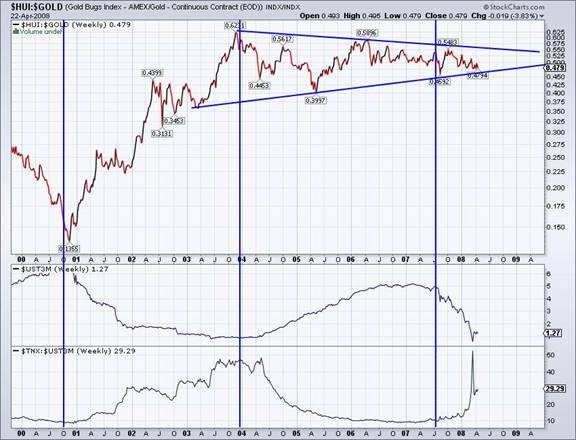Onemonth Tbill yield rises to highest since 2008
Post on: 31 Август, 2015 No Comment

BenEisen
NEW YORK (MarketWatch) — Yields on one-month Treasury bills spiked Tuesday after a lackluster auction. The short-term debt, which is most sensitive to a hike in the nation’s borrowing limit, has been building in a risk premium due to the debt-ceiling standoff in Washington.
The Treasury Department has a number of one-month bills US:1_MONTH maturing just after the federal government is slated to hit its borrowing limit on October 17, increasing the still-minimal risk of a delay in payments on the debt. That risk pushed up the one-month yield by 17.5 basis points Tuesday to 0.330%, its highest level since the fall of 2008. Yields move inversely to prices.
That spike in yields becomes even more extraordinary when considering that the last time the one-month bill yield was this high, the Federal Reserve wasn’t holding down its short-term interest rates. It reflects the growing a risk that liquidity could drain from the market, according to Zach Pandl, senior interest-rate strategist at Columbia Management.
“Investors think of Treasury bills as a substitute for cash, and the worst thing that can happen for the Treasury bill market is to have any kind of payment delay,” he said.
Reuters
Washington is in partial shutdown mode for the second week as lawmakers work on a spending bill and increase to the debt ceiling.
The commotion in the Treasury bill market captured the attention of President Barack Obama, who said Tuesday in a press conference that, “there comes a point in which if the Treasury cannot hold auctions to sell Treasury bills, we do not have enough money coming in to pay all our bills on time.”
The markets are expecting lawmakers to reach an agreement on a spending bill and debt-ceiling hike before running up against the borrowing limit. But a debt-ceiling deal with no strings attached is looking less likely this week, according to news reports. Olivier Blanchard of the International Monetary Fund said a U.S. failure to raise the debt ceiling would be a “major event” .
The Treasury Department sold $30 billion of the one-month bills at a high yield of 0.350%, which is a jump from the 0.120% yield on last week’s auction. Bidders offered to buy 2.75 times the amount of debt for sale, the smallest bid since March of 2009. Indirect bidders purchased 31.0% of the bills while direct bidders bought another 8.9%.
“The Street is hesitant to position paper in that area, because whatever minuscule chance there is, you don’t want to be sitting there holding that paper,” said Thomas Roth, director of government trading at Mitsubishi UFJ Securities U.S.A. Inc.
Demand was stronger for an auction of $30 billion worth of 3-year notes US:3_YEAR on Tuesday, proving that longer dated Treasury investors are not reflecting the fear of a default. The notes sold at a yield of 0.710%. Nondealers took down a greater-than-average share of the debt: indirect bidders, which include foreign central banks, bought 34.4%, compared with 32.1% in the last six sales. Direct bidders, which often include money managers, bought 19.7%, versus 14.4% in recent sales.
Why Democrats are dug in on shutdown impasse
Republicans have several goals in the current government shutdown. Democrats have just one: Break the fever, code for ending the cycle of recurring, last-minute crises over spending bills and increases in the debt ceiling. Jerry Seib explains. Photo: Getty.
After the auction, the 3-year note yield traded 3 basis points higher at 0.678%. The benchmark 10-year note US:10_YEAR yield rose a basis point to 2.639% while the 30-year bond US:30_YEAR yield fell slightly to 3.692%.
“Although the shutdown of the federal government and the lack of agreement in Congress on extending the debt ceiling have pushed up the cost of insuring against a default by the U.S. sovereign, this development has not had an adverse impact on longer-dated Treasurys so far,” said John Higgins, chief markets economist at Capital Economics, in a note.
The Federal Reserve decided not to scale back its easy-money policies during its meeting last month, giving a boost to the bond market, which has benefited from its $85 billion in monthly bond-buying. The Fed has said any monetary-policy change will be based on data, but the partial government shutdown has delayed much of the data this month, including last Friday’s nonfarm payrolls report and Tuesday’s trade data.
Nonetheless, two Fed members said Tuesday they would have backed tapering. A third mentioned the possibility of an October or December taper .














